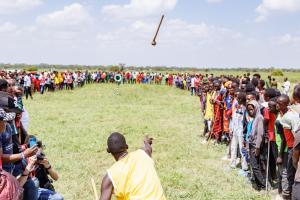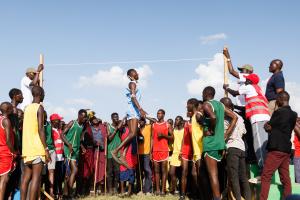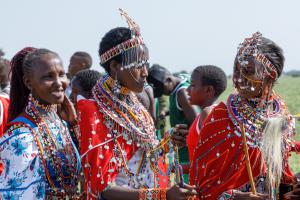
Kenya’s Maasai Warriors Hunt For Medals Not Lions In ‘Olympics’ To Protect Predators

A competitor throws a traditional club called a rungu at the Maasai Olympics in Kenya on Dec 14 2024 PHOTO Jeremy Goss/Big LIfe Foundation
Kenyan warriors used to kill lions to show bravery and strength. With predator numbers crashing, tribe elders and NGO Big Life Foundation found an alternative
KIMANA, AMBOSELI, KENYA, December 18, 2024 /EINPresswire.com/ -- Young warriors who traditionally killed lions as a rite of passage competed in the 6th Maasai Olympics, a biennial event drawing huge crowds that has helped protect predators in Kenya’s southern savannahs.
Hundreds of people gathered at the community-owned Kimana Sanctuary 200km south of the capital Nairobi to watch 160 men and women compete in a series of contests including running, spear throwing, and the iconic Maasai high jump.
Traditionally, young Maasai men hunted lions to prove their manhood, bravery, and strength, earning them prestige and attracting suitors. But with the loss of habitat driving lions towards extinction locally, ritual killings were judged to be reducing populations unnecessarily.
Community elders approached local conservation organisation Big Life Foundation 12 years ago with an idea to replace lion killing as a cultural practice with an alternative competitive event that could also test the warriors. The Maasai Olympics combines the sports events with conservation education.
The number of lions in the landscape has increased by roughly sevenfold since 2004 to an estimated 250 today, thanks to the Maasai Olympics and other programmes from Big Life, fellow conservation group Lion Guardians, and efforts of the Kenya Wildlife Service and both national and Kajiado County governments.
This bucks the catastrophic global trend that has seen lions lose 94% of their range. Today there are estimated to be 23,000 lions left, compared to 300,000 gorillas and 400,000 African elephants.
Once widespread in Africa, they are now listed as Vulnerable on the IUCN Red List. In Kenya, lion numbers have fallen by 40% over two decades, primarily due to habitat loss from deforestation, farming, and land conversion.
Benson Leiyan, CEO of Big Life Foundation said: “The Maasai Olympics aims to spark a shift in perspective among the warrior generation, who will become the future stewards of this ecosystem, emphasising that lion hunting is no longer a viable cultural practice. Instead, protecting our environment is key to ensuring a stable future for both these warriors and their families. This initiative, conceived by the elders and supported by us, alongside other predator protection strategies, has achieved remarkable success.”
While the ritual killing of lions is now a thing of the past, local people still occasionally kill the big cats if they prey on livestock. Big Life and other conservation organisations work to reduce these threats by compensating people who lose their cows, sheep and goats to lions, and building predator-proof livestock enclosures.
Big Life also runs socio-economic programmes designed to ease the costs local people face from living alongside wildlife, primarily earning income from tourism and leasing their land to conservation, but increasingly in the form of services like healthcare and education.
Local and regional heats for this year’s Maasai Olympics competition kicked off in August between the four competing villages of Eselenkei, Kuku, Mbirikani and Rombo. The finals were held on Saturday December 14.
Stephen Masindet, 21, from Rombo, won the 5,000m and 800m races. He said: "I started running in 2021 when I was in high school. I came third position but now I’ve been training a lot and today I came first. The Maasai Olympics encourages warriors not to kill lions. Wildlife like lions helps us so we want to protect wildlife. It brings jobs, school fees, tourists and other things so it’s very good and it motivates young people to become athletes."
The event is possible thanks to the primary sponsors Charles and Judy Tate, Play for Nature, Chester Zoo, Angama Amboseli, and WWF Kenya. Additional contributions were made by from Blaize Investment, Dokolo Kolmerek, Equity Afya Oloitokitok, Equity Group, First Aid and Medical Group, Great Plains Foundation, Jimtech Suppliers Ltd, Julie Supan, Lion Guardians, Martcy Investment Ltd, Ned Holmes, Ollin Sacco, Oltepesi Plant, Penety Resort, Solagen Power Ltd, and Transjet Ltd.
Big Life expressly thanked the project coordinator, Samuel Kaanki, and the volunteer teachers, sports officials, and coaches whose tireless work has made this project such a success, and its tourism partner in the Kimana Sanctuary, Angama Amboseli, for co-hosting the event.
Mike Pflanz
Plantwood Communications
mike.pflanz@plantwoodcommunications.com
Visit us on social media:
Facebook
X
Instagram
Distribution channels: Culture, Society & Lifestyle, Environment, Sports, Fitness & Recreation, Travel & Tourism Industry, World & Regional
Legal Disclaimer:
EIN Presswire provides this news content "as is" without warranty of any kind. We do not accept any responsibility or liability for the accuracy, content, images, videos, licenses, completeness, legality, or reliability of the information contained in this article. If you have any complaints or copyright issues related to this article, kindly contact the author above.
Submit your press release

